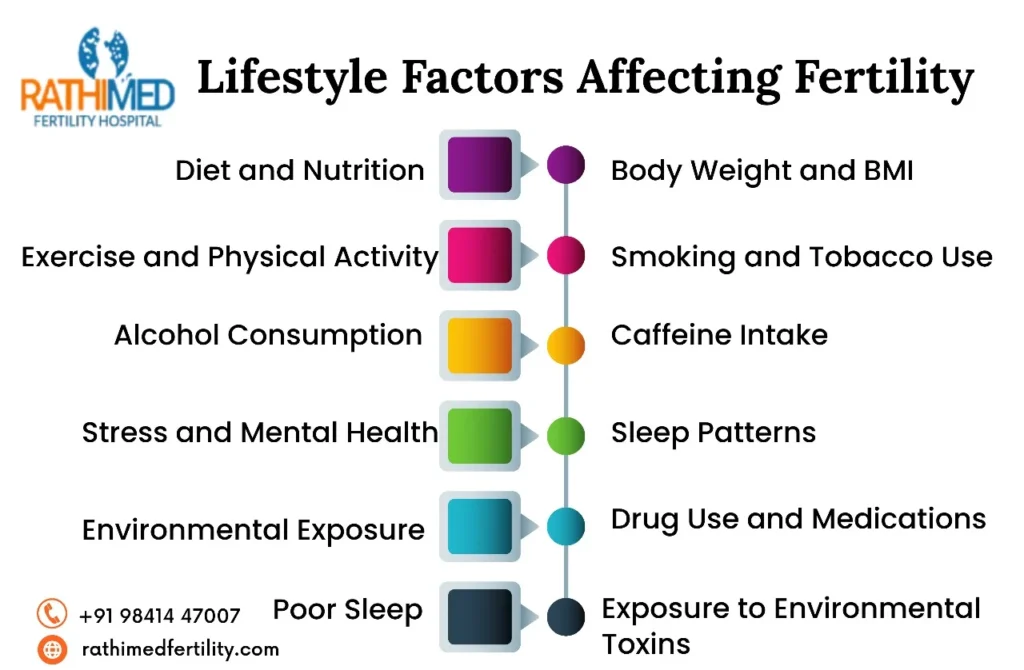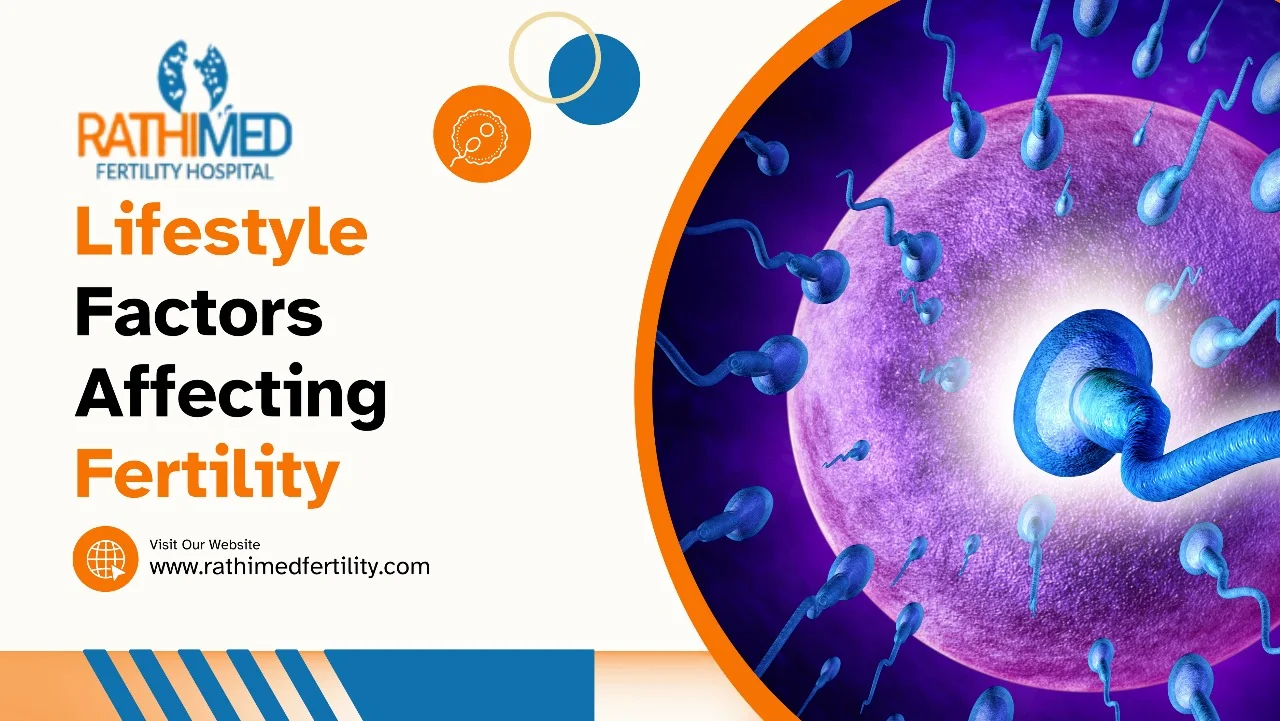Fertility is influenced by a wide range of physical, emotional, and environmental factors. Many couples struggle with conception without realizing how much their daily habits contribute. At Rathimed Fertility Centre, we focus on understanding the root causes and guiding couples through personalized solutions, including natural and medical options.
This blog answers essential questions about infertility, offers insights into the lifestyle factors affecting fertility, and provides natural ways to support reproductive health.
What Can I Do to Increase My Fertility?
Improving your fertility begins with creating the right environment for conception. Here are the most effective steps:
- Maintain a balanced diet (see: diet and fertility health)
- Keep a healthy weight
- Exercise moderately
- Quit smoking and alcohol
- Reduce stress (stress and infertility are closely linked)
- Track ovulation and time intercourse appropriately
These steps help regulate hormones, improve egg and sperm quality, and support overall reproductive wellness. Addressing the lifestyle factors affecting fertility can significantly boost your chances of conception.

What Causes Infertility?
Infertility is typically defined as the inability to conceive after one year of unprotected intercourse. It may be caused by issues in either or both partners.
Common Causes in Men:
- Low sperm count or motility
- Hormonal imbalances
- Varicocele (enlarged veins in the scrotum)
- Smoking, alcohol, or drug use
Common Causes in Women:
- Ovulation disorders (e.g., PCOS)
- Blocked fallopian tubes
- Endometriosis
- Uterine fibroids
- Age-related decline
- Poor lifestyle choices (lifestyle factors affecting fertility like stress, diet, and toxins)
Why Addressing Infertility Is Important
Ignoring infertility can lead to emotional stress, strained relationships, and missed treatment windows. Addressing it early allows for timely intervention, better success rates, and peace of mind. At Rathimed Fertility Centre, we promote awareness and early diagnosis so couples can take proactive steps, especially with modifiable lifestyle factors affecting fertility.
Key Points: Causes of Infertility in Women
Hormonal Imbalance: Often caused by PCOS, thyroid disorders, or high prolactin levels
- Ovulation Problems: Irregular periods, anovulation, or absence of menstruation
- Blocked Tubes: Often due to infections or pelvic inflammatory disease
- Endometriosis: Uterine lining tissue growing outside the uterus, causing pain and infertility
- Age: Egg quality and quantity decline significantly after age 35
- Poor Lifestyle: One of the main lifestyle factors affecting fertility in women includes high stress levels, poor nutrition, smoking, and sedentary habits
Understanding the root causes enables targeted treatment and lifestyle modification, increasing your chances of natural conception.
Tips to Improve Fertility Through Lifestyle Changes
| Lifestyle Factor | Impact on Fertility | How to Improve |
| Stress and Mental Health | Chronic stress can disrupt ovulation, sperm production, and hormonal balance. Stress and infertility are closely linked in both men and women. | Practice yoga, meditation, breathing exercises, and seek emotional support or therapy if needed. |
| Unhealthy Diet | Poor eating habits can lead to obesity, hormonal imbalances, and nutrient deficiencies. There is a strong connection between diet and fertility health. | Focus on whole foods, antioxidants, and fertility-friendly nutrients like zinc, folate, and omega-3 fatty acids. |
| Being Overweight or Underweight | A high or low BMI can affect ovulation and reduce IVF success rates. Weight extremes are major lifestyle factors affecting fertility. | Aim for a healthy BMI (18.5–24.9) with balanced nutrition and regular physical activity. |
| Smoking and Tobacco Use | Tobacco damages eggs and sperm, accelerates ovarian aging, and reduces implantation success. It’s a major contributor to lifestyle factors affecting fertility. | Quit smoking and avoid secondhand smoke; consider cessation programs if necessary. |
| Alcohol Consumption | Regular or heavy drinking lowers fertility in both sexes. It impacts hormone levels and embryo development. | Regular or heavy drinking lowers fertility in both sexes. It impacts hormone levels and embryo development. |
| Environmental Toxins | Exposure to pesticides, BPA, heavy metals, and air pollution can negatively affect reproductive function. | Reduce plastic use, eat organic, avoid harsh chemicals, and improve indoor air quality. |
| Lack of Quality Sleep | Sleep influences hormonal cycles. Irregular or insufficient rest affects ovulation and sperm quality. | Maintain a sleep schedule, limit screen time at night, and aim for 7–8 hours of sleep. |
| Inactivity or Over-Exercising | Both sedentary habits and excessive workouts can alter hormone levels and disrupt menstrual cycles. | Engage in moderate physical activity (30 minutes daily); avoid overtraining. |
| Recreational Drugs and Medications | Substances like marijuana, steroids, and some prescription drugs can impair fertility and hormone production. | Consult your doctor about safe medications when trying to conceive. Avoid recreational drugs entirely. |
| Delaying Parenthood | Fertility declines with age. Lifestyle choices such as career prioritization may unintentionally impact fertility potential. | Get fertility evaluations early. Consider fertility preservation if planning to delay childbearing. |
Natural Fertility Boosters and Supplements
While diet and habits form the base of natural fertility, supplements can support hormonal and reproductive health when taken under guidance.
Popular Natural Fertility Boosters:
- Folic Acid: Supports cell growth and ovulation
- CoQ10: Improves egg and sperm quality
- Vitamin D: Important for hormone function
- Zinc and Selenium: Enhance sperm production and egg development
- Omega-3 Fatty Acids: Reduce inflammation and promote hormonal balance
Always consult a fertility expert before starting supplements. At Rathimed, we evaluate your specific deficiencies and recommend supplements that support your body’s needs.
Conclusion
Understanding and addressing the lifestyle factors affecting fertility can significantly increase your chances of a healthy pregnancy. Through smart dietary choices (diet and fertility health), stress management (stress and infertility), regular activity, and avoiding harmful substances, couples can take meaningful steps toward parenthood.
At Rathimed Fertility Centre, we blend advanced fertility care with holistic lifestyle support. Whether you’re just starting your journey or have been trying for a while, we’re here to guide you every step of the way.
Take the first step today. Book your consultation with Rathimed Fertility Centre and embrace the power of lifestyle change.


